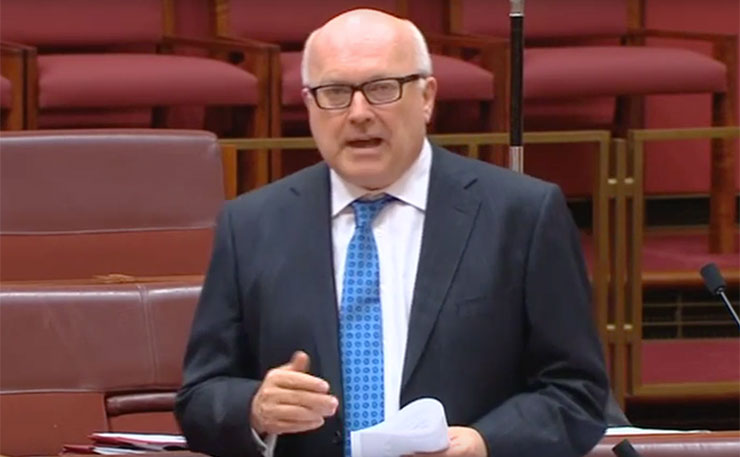The shortfall in funding for community legal centres is causing a crisis. Just ask the Productivity Commission, writes Liana Buchanan.
There was an unexpected revelation in Senate Estimates last week. Responding to a question by Senator Nick McKim, Federal Attorney-General George Brandis said the government would respond in this term to a September 2014 Productivity Commission report on access to justice – essentially, a report on services providing free legal help for people who cannot afford a private lawyer.
The revelation was unexpected because the delay in response has been so long, quite possibly because a key recommendation of the report is that federal and state governments boost legal assistance services – legal aid, Aboriginal legal services, family violence prevention and legal services, and community legal centres – by $200 million a year. The Federal Government’s share of this figure is $120 million per year.
While it’s clear state governments will also need to respond to the recommendation – Victoria, for example, has made modest, interim community legal centre grants and is conducting an access to justice review – the actions of the Federal Government directly contradict it.
Federal funding has not only failed to match steadily climbing demand for legal assistance, cuts locked in by the Federal Government in July last year under a new five-year National Partnership Agreement will see community legal centres lose 30 per cent of their Federal funding come July 2017.
Muddying the funding picture is the Federal Government’s references to total funding for the different services that make up the legal assistance sector. At $1.6 billion over five years this is an apparently significant sum, but one found to be clearly inadequate by the Productivity Commission. Within that figure, community legal centres will get around 11 per cent of the total, dropping to just $30.1 million nationally in 2017.
Yet free legal help provided by community legal centres spans a broad territory of deep and growing need in family law, family violence, credit and debt, consumer problems, infringements, tenancy and workplace matters, among many others issues. If a community legal centre can’t help, there’s often no-one else who can. Without help, individuals and their families face dire consequences, including loss of income, eviction, exposure to abuse or growing debt.
Nationally, centres helped more than 200,000 people in 2013–14, but in the same year, before the cuts even take effect, under-funding was a central factor in more than 150,000 people being turned away.
The looming cuts, if the Federal Government does not reverse them in the 2016 Budget, threaten to drastically increase the number of people with legal problems who will be denied legal solutions – including women seeking intervention orders through the courts to protect them from family violence.
In Victoria alone, 40 per cent of new cases initiated last year were family violence cases.
There’s simply no denying that, at the level of individual community legal centres, the impacts of underfunding and extensive cuts will be felt by people in crisis.
Goulburn Valley Community Legal Centre will lose a lawyer helping women with family violence and family law in one of the highest need, most disadvantaged areas in Victoria. Darebin Community Legal Centre will be unable to help 150 women ineligible for legal aid with family law matters, including the custody of children. The City of Wyndham, the fastest growing municipality in the country, and with a booming youth population, will lose all the youth law services currently provided by the Western Community Legal Centre.
Similar impacts will be felt by clients of many of the nearly 200 community legal centres around Australia.
At last year’s national conference of community legal centres, the Attorney-General said that “the work of community legal centres is at the heart of Australia’s aspiration to be a fair society”. He clearly acknowledges the value of community legal centre work, but until now he has failed to match that acknowledgement with funding.
The picture gets even worse when Federal Government spending on legal assistance is placed in the context of its legal spending more broadly.
Based on the Productivity Commission report, the shortfall in legal assistance funding over a five-year period is at least $1 billion. Over that same period, based on its own figures, the Federal Government will likely spend well over $3 billion – not on frontline legal services for people who can’t afford a lawyer, but its own legal advice and representation.
Despite the free legal help they provide, and escalating legal need, community legal centres are funded at a paltry fraction of broader legal assistance spending, spending which in turn is inadequate and dwarfed by the Federal Government’s legal spending on itself.
In its defence, the Federal Government has pointed to last September’s Women’s Safety Package, but for legal assistance at least, that package was swamped by broader cuts outside the spotlight of media attention. Just $15 million of the package over three years went to a handful of community legal centres nationally, including just three of fifty centres in Victoria. That sum barely covers just the first year of cuts slated to roll out from 2017 to 2020.
After denying any cuts were planned, the government finally came clean in the Senate in October last year, when Senator Michaelia Cash stated that the shortfall in community legal centre funding would be looked at as part of the 2015 Mid-Year Economic and Fiscal Outlook or normal budgetary processes.
MYEFO came and went with no new funding, so the question of what is to be done falls squarely on the 2016 Federal Budget.
If the Federal Government truly intends to respond to the Productivity Commission this term, it must do so in time to inform the Budget.
The Law Council of Australia recently called for a substantial injection in funding. Now the National Association of Community Legal Centres has made a Budget submission to Treasury mapping a clear path to legal funding to meet legal need. That submission calls for all cuts to be reversed and the Productivity Commission to be heeded.
It’s time for the Federal Government to act.
Donate To New Matilda
New Matilda is a small, independent media outlet. We survive through reader contributions, and never losing a lawsuit. If you got something from this article, giving something back helps us to continue speaking truth to power. Every little bit counts.





